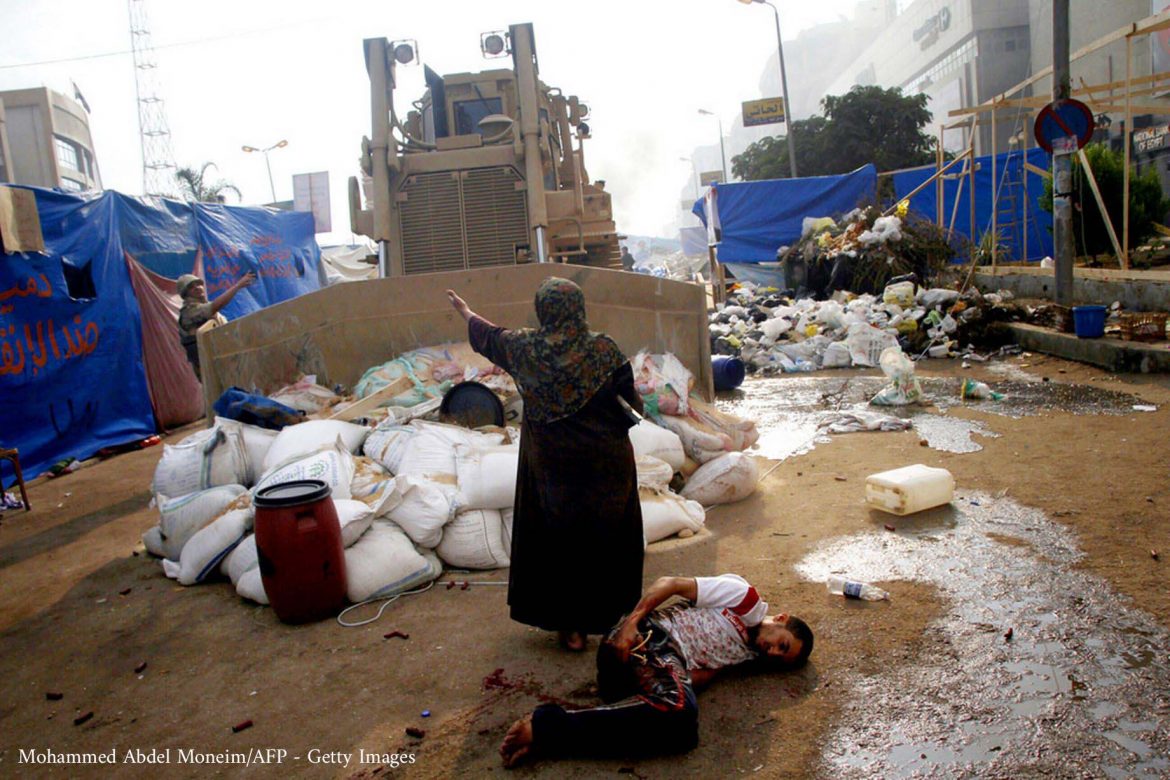The Fifth Anniversary of the Rabaa al-Adawiya Massacre
Five years after the violent dispersals of the Rabaa al-Adawiya and al-Nadha sit-ins, there has neither been accountability for perpetrators nor justice for victims and survivors. At least 900 people were killed and 1492 were injured, according to rights reports. Not a single person has been held responsible for the brutal extrajudicial killings committed on August 14, 2013 or the following week. The undersigned organizations unequivocally reject the judicial processes connected to the events of those days, which have not resulted in any form of accountability for the perpetrators but have instead been deliberately misapplied to retaliate against survivors of the massacre, either through imprisonment or the death penalty.
On July 28th, 75 defendants in Case No. 34150/2015 were referred by the Cairo Criminal Court for a death sentence, which must be authorized by the Grand Mufti, Egypt’s highest Islamic official. The case, which is also known as the Rabaa Dispersal Case, was initiated five years ago and is part of punitive proceedings against survivors of these state-sponsored massacres. 739 defendants face charges ranging from “planning and participating in an assembly” and “joining an illegal group,” as well as participating in violence, vandalism, and murder. Among those defendants is photojournalist Mahmoud Abu Zeid, known as Shawkan, a recipient of UNESCO’s Press Freedom Prize, who was held five years in pretrial detention and now faces the death penalty for carrying out his professional duties in covering the demonstration.
A shocking level impunity, brutal repression of demonstrators, and grossly unjust judicial rulings have all become commonplace in Egypt over the last five years with systematic retaliation against political activists, human rights defenders, journalists and bloggers. Extrajudicial killings, enforced disappearances, torture, inhumane treatment and medical neglect at detention sites have become pervasive and systematic.
Meanwhile, those who perpetrate killings and human rights abuses remain unpunished. This unaccountability is institutionalized into law by the state, as exemplified by Law No. 161 of 2018 on “treatment of the armed forces’ senior commanders,” which authorizes the president to give diplomatic immunity to senior officers. It further grants immunity to senior officers for any act committed during the period the Constitution was suspended – from July 3 2013 to January 10 2016. If anything, the law serves as compelling evidence of the regime’s fear of being held accountable for the crimes it has committed over the last five years.
These state crimes began in earnest when President Sisi, who was then defense minister and deputy prime minister for security affairs, gave the green light to security services to suppress demonstrations against the overthrow of former President Mohamed Morsi. Sisi called on his supporters to come out in a demonstration giving him a mandate to “fight terrorism” in July 2013. 95 people were killed on the first day of this mandate, followed by security clashes with groups protesting the ouster of Morsi, most of them concentrated in Rabaa al-Adawiya Square in Nasr City and al-Nahda Square in Giza. This planning at the highest echelons of the Sisi government resulted in one of the worst civilian massacres in modern world history.
On 11 August 2015, the Rabaa Dispersal Case was referred to the Cairo Criminal Court, which failed to observe the minimum guarantees of a fair trial; and on July 28th, 75 defendants were sentenced to death. The ruling comes in the context of an unprecedented rise in the use of the death penalty in Egypt. Since December 2017, at least 39 people have been executed after being convicted in fundamentally flawed trials. The European Parliament and five UN Special Rapporteurs called on the Egyptian government to suspend executions, due to state’s failure to respect the fundamental right to a free and fair trial – which in this case includes the misuse of Egypt’s judicial system to exact revenge on survivors of state violence rather than to serve justice to the perpetrators.
Signatory Organizations:
- Cairo Institute for Human Rights Studies (CIHRS)
- Egyptian Front for Rights and Freedoms
- Committee for Justice
- The Freedom Initiative
- Nadeem Center
- Adalah Center for Rights and Freedoms (ACRF)
- The Egyptian Coordination for Rights and Freedoms
Share this Post

